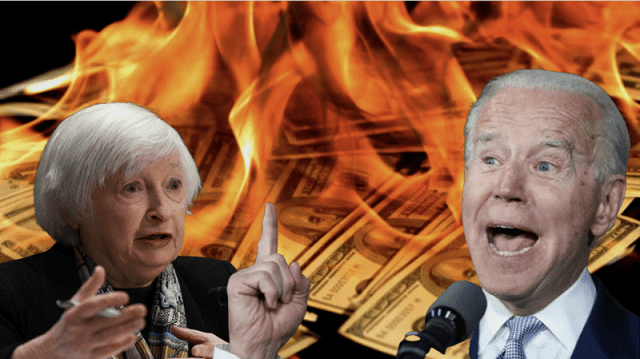Biden Treasury Secretary’s Policy Destroys Small U.S. Banks While Bailing Out Chinese Depositors, Experts Say

Once the big four banks control all the money, they will control everything else, including what kind of business you can run, what you can and cannot say on social media, and what opinions you can hold.
This is the biggest power grab since the election rigging of 2020.
Janet Yellen’s Policy Would Destroy Small US Banks While Bailing Out Chinese Depositors, Experts Say
By: Jason Cohe, Daily Caller, n on March 17, 2023
- Treasury Secretary Janet Yellen’s recent decision to backstop all uninsured deposits at two failed banks due to their “systemic risk” to the U.S. economy not only benefits the Chinese Communist Party, but also potentially endangers smaller financial institutions, experts told the Daily Caller News Foundation.
- Silicon Valley Bank and Signature Bank both collapsed last week, resulting in a full takeover of the financial institutions by the Federal Deposit Insurance Corporation.
- “It’s absolutely atrocious that we are yet again, using taxpayer money to bail out the CCP,” E.J. Antoni, research fellow for Regional Economics at The Heritage Foundation’s Center for Data Analysis, told the Daily Caller News Foundation.
Treasury Secretary Janet Yellen’s recently announced policy to safeguard all uninsured deposits at failing banks deemed to be a “systemic risk” to the U.S. economy would destroy smaller financial institutions while simultaneously bailing out Chinese depositors, experts told the Daily Caller News Foundation.
Yellen, alongside the Federal Deposit Insurance Corporation and Federal Reserve, announced Sunday that all uninsured depositors who held accounts at the now-defunct Silicon Valley Bank (SVB) and Signature Bank would be fully covered, adding that “decisive actions” were needed to “protect the U.S. economy.” SVB was particularly popular among Chinese tech startups, as it provided easy access to U.S. investor funding, CNBC reported.
SVB’s stock collapsed last week amid numerous customer bank runs following the institution’s disclosure of a $1.8 billion net loss on asset sales on the back of high interest rates, forcing regulators to shut down the bank. Just two days later, Signature Bank, a premier lender in the crypto space, was closed by regulators due to “systemic risks,” CNBC reported.
A bailout of uninsured depositors at the collapsed banks benefits the Chinese Communist Party at taxpayers’ expense and could lead to stricter regulatory controls that smaller U.S. banks would be unable to withstand, experts told the DCNF.
“It’s absolutely atrocious that we are yet again, using taxpayer money to bail out the CCP,” E.J. Antoni, research fellow for Regional Economics at The Heritage Foundation’s Center for Data Analysis, told the DCNF. “And so now whenever the government has these knee-jerk reactions, we end up sending dollars where the American people would not like them to go.”
During COVID-19, when the government authorized sending Payment Protection Program loans and unemployment payments, it also distributed taxpayer dollars to individuals in China, Antoni told DCNF. “Anytime the government spends money, they’re by definition spending taxpayer dollars … So taxpayers are ultimately on the hook for all of this.”
In 2012, SVB launched a joint venture with Shanghai Pudong Development Bank (SPDB), resulting in the creation of SPD Silicon Valley Bank Co., CNBC reported. The venture was focused on providing services to tech startups.
Additionally, in the wake of the SVB collapse, lawmakers may seize on the chance to create a restrictive regulatory environment that “small community banks are just not going to be able to withstand,” according to Alfredo Ortiz, president and CEO of the Job Creators Network.
Unlike big banks, smaller financial institutions face greater scrutiny from regulators, Anne Balcer, Independent Community Bankers of America senior executive vice president and chief of Government Relations and Public Policy, told the DCNF.
“There’s almost a disproportionate or heightened scrutiny on the smaller institutions,” Balcer said. “Regulators keep a much tighter leash on the community banks, which is ironic,” because they are less risky than banks like SVB.
AUTHOR
Pamela Geller
EDITORS NOTE: This Geller Report is republished with permission. ©All rights reserved.


Leave a Reply
Want to join the discussion?Feel free to contribute!